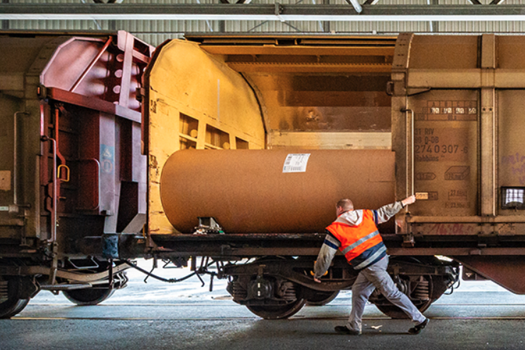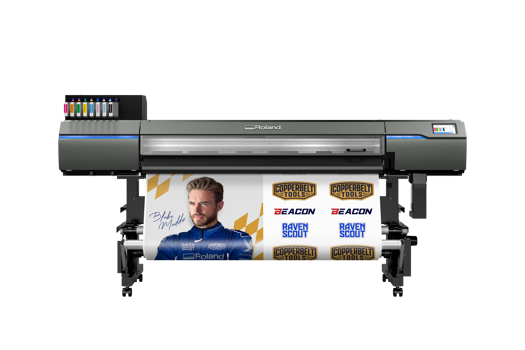On Friday afternoon (22 April), UPM and Finnish papeworkers' union Paperiliitto announced that an accord had at last been achieved.
The strike began on 1 January and had reached nearly four months at 112 days – the longest industrial action of its kind in Finland.
Some 2,100 workers had been on strike, with 200 of them required to continue working on tasks deemed critical to society.
Printing industry leaders overwhelmingly responded with relief at the news, but with the caveat that there remained questions over just how long it would take for supplies to be restored.
Regarding the restart of the mills, a UPM spokesperson told Printweek: “Workers have returned to work over the weekend. Run-up times vary from mill to mill, and a detailed timetable cannot be provided, especially when the machines and processes have been standing for months.
“Generally speaking, the ramp up of pulp mills takes less time than the ramp up of paper mills, and the slowest to warm up will be the Lappeenranta biorefinery,” the spokesperson stated.
UPM has also written to customers explaining how the resumption of deliveries will be handled.
The group said that, considering the ongoing market tightness and its ramp-up schedule, orders already placed have priority and will be handled first as of this week (week 17).
“We plan to accept additional orders earliest as of week 19, please be aware that we have a lead-time of 3-4 months for our European deliveries and up to 5 months for our overseas deliveries,” UPM said.
The manufacturer also flagged that the “exceptional situation” would also result in a very high workload for its order management and supply chain teams.
The UPM mills impacted by the strike action were:
- UPM Jämsänkoski (graphic papers including uncoated magazine paper and specialty papers)
- UPM Kymi (WFC and WFU graphic papers including Finesse and Fine)
- UPM Kaukas (LWC graphic papers including Ultra and Star)
- UPM Rauma (LWC magazine papers)
- UPM Tervasaari (specialty release liner base papers)
- UPM Raflatac Tampere (labels)
In addition the UPM Kymi, UPM Pietarsaari and UPM Kaukas pulp mills were included, as was the UPM Kaukas biorefinery.
After a previous planned maintenance and upgrade shutdown at UPM Kymi the mill was back in full operation four days after the work was completed. At integrated mills the pulp mill has to be started up first, which can take several days.
One paper manufacturing expert told Printweek that start-up could also be extended if clothing on the paper machines – such as press felts, forming fabrics, and dryer fabrics – also have to be changed
Industry reaction:
Charles Jarrold, CEO, BPIF
“From the BPIF’s point of view we are delighted to hear the news that agreement has been reached – the disruption really was the last thing the sector needed with so many other challenges in the supply chain.
“We’ve been working closely with the most affected parts of our industry who’ve had a pretty torrid time trying to prevent critical supply chains being even more disrupted. We’ve also kept government closely advised, as it’s been an area of concern for them – particularly in respect of the food and pharmaceutical sectors, and they’re pleased and relieved to hear the news too.”
Nick Gee, managing director, Denmaur Paper Media
“Whilst we have managed to keep the majority of our customers satisfied there were certain areas that were just impossible, certain label products for example. I am delighted common sense has prevailed and the dispute has been resolved, however we all need to realise that it will take some time before normal service is resumed.
“I’m no engineer nor paper maker but I can only imagine that paper machines that have sat idle through the Finnish winter may not be producing saleable paper immediately, and with the whole pipeline so empty it will be a while before we see normality return.”
Will Parker, label industry expert and FINAT committee member
“Having reflected over the weekend, what disappoints me is clearly this decision [to take on the unions] was planned, but no planning was given to building stock and inventory to cover the inconvenience to the customer. Had they built stock, which they could have done last year, the market wouldn’t have felt the pain.
“UPM has levied price increase after price increase and used the money to solve an internalised dispute, but none of that money has been apportioned to supporting customers. I would suggest that’s a failing in planning, a huge disrespect to the customer, and one that I’m not entirely sure will aid the swift recovery by UPM with its customers’ trust and confidence.
“I expect this will have ramifications that will change the supply of label glassine. Somebody, somewhere will start producing an alternative supply.
“I also think that in some little time the industry or parts of the industry may choose to test UPM’s force majeure position in court. The amount of pain it’s caused could have been avoided.
“The end of the strike is cause for limited celebrations that they’ve packed it in, albeit they’ve packed it in for four years when we know they’ve booked an appointment to fall out again!”
Mike Roberts, managing director, PMG Print Management and IPIA president
“Thank goodness for the whole industry, now we can attempt to give clients what they need.”
Andrew Bowden, managing director, Westcolour
“Some positive news for the industry at last!”
Ian Kendall, CEO, Reflex Group
“We’ve got to remember that things were far from normal before the strike anyway. There were extended lead times, lack of availability and all sorts of supply chain difficulties.
“It’s going to take them months to get back to normal. You can’t just fire up paper mills and machinery that’s been standing for four months.
“What I can’t get out of my head is the billions of pounds worth of supply chain damage UPM and the unions have done between them. I think the repercussions for UPM are going to be huge. I think their brand is tainted. I know a lot of people and brand owners who, moving forward, will want to know that they are not dealing with UPM.
“Material that we used to be able to get in two days, if we order today, it will be August or September. That’s the supply chain damage and impact that has happened.
“The damage is just epic. We’ve tried to do our best but I’ve had customers be hysterical. I’ve had customers swearing at me. It’s been horrendous.”










